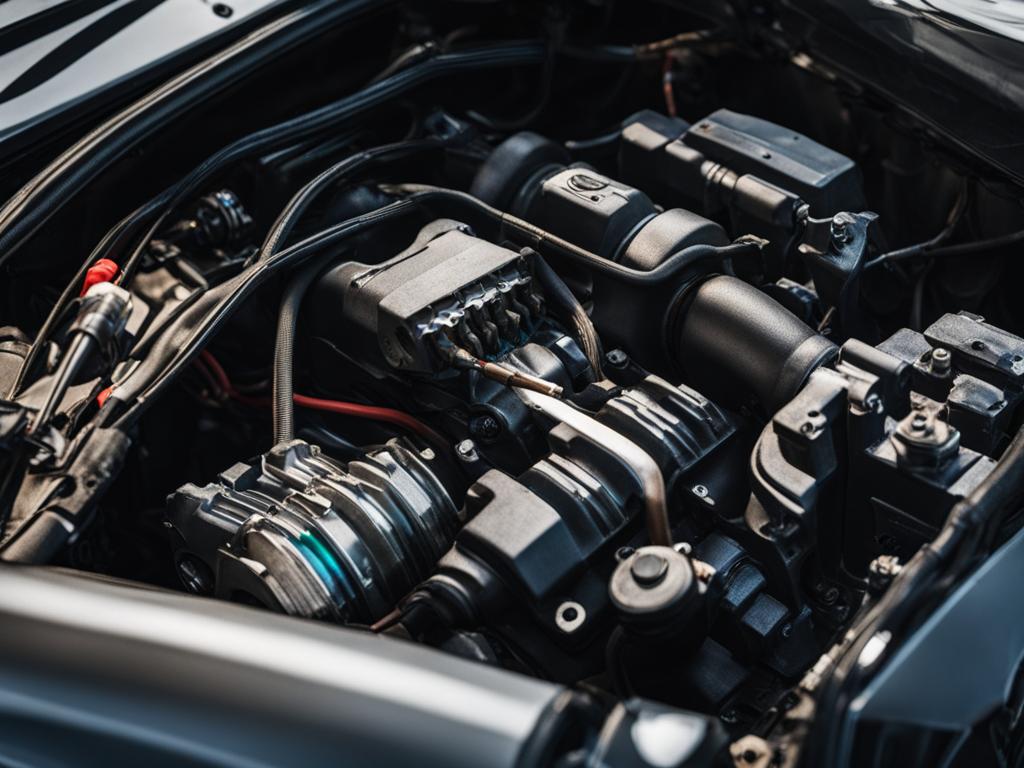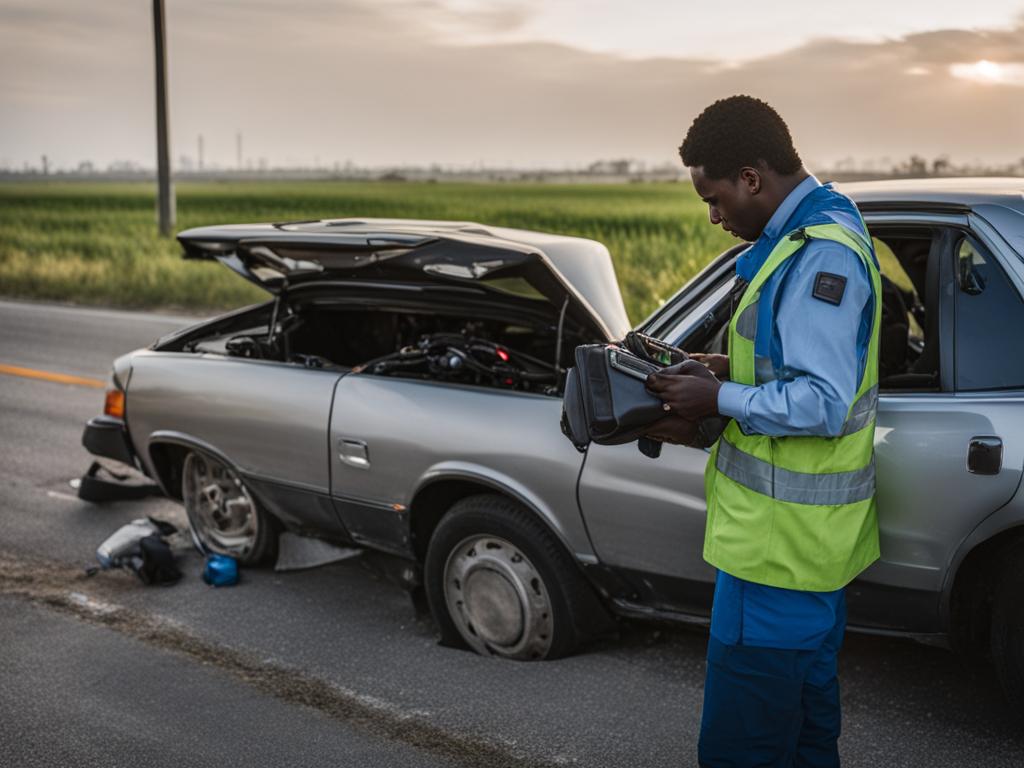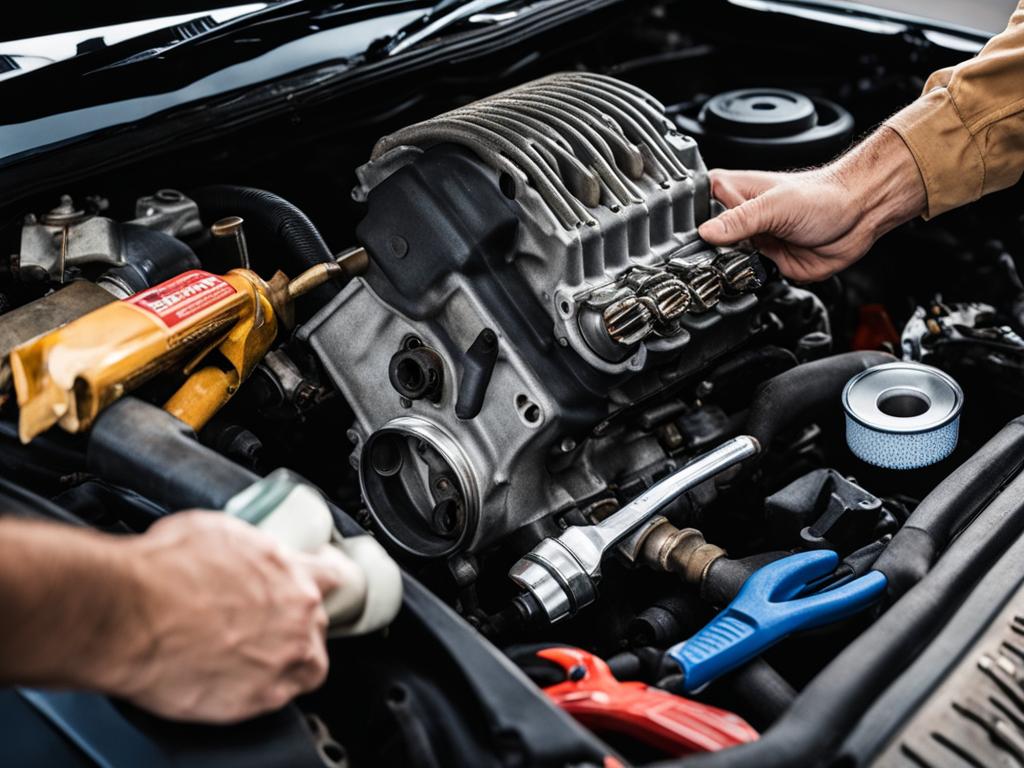Car Shuts Off While Driving – No Warning Signs
Experiencing a sudden shutdown while driving can be a frightening and dangerous situation. There are several potential causes for a car shutting off while driving, and it’s important to address this issue promptly to ensure safety on the road. In this article, we will explore the possible reasons for a car shutting off while driving and provide tips on how to fix and prevent this problem.
Key Takeaways:
- Car shutting off while driving without warning signs can be a cause for concern.
- Possible causes include a faulty crankshaft position sensor, faulty Engine Control Unit, or fuel system issues.
- Regular maintenance, inspections, and prompt repairs are crucial for preventing engine shutdown while driving.
- Seeking professional assistance is recommended for diagnosing and resolving the problem.
- Prioritizing safety and following expert advice can ensure a safer and more reliable driving experience.
Common Causes of Car Shutting Off While Driving
A car shutting off while driving can be a puzzling and potentially dangerous situation. It’s important to identify the underlying causes to prevent future incidents and ensure your safety on the road. In this section, we will explore common reasons why a car may shut off while driving, including engine cutting out while driving no check engine light, engine shutting down while driving no warning lights, and car suddenly stops running while driving no warning lights.
There are several potential causes for a car shutting off while in motion. Let’s take a closer look at some of the main culprits:
- Faulty Crankshaft Position Sensor: A faulty crankshaft position sensor can lead to an engine misfire and eventual stalling. This sensor helps the Engine Control Unit (ECU) gauge the correct timing for fuel injection and ignition. Symptoms may include rough engine running and a malfunctioning tachometer. Diagnostic trouble codes between P0335 and P0338 may also indicate a problem with the crankshaft position sensor.
- Faulty Engine Control Unit: A malfunctioning Engine Control Unit can cause sudden drops in power and fuel efficiency, leading to engine shutdown. Symptoms may include the car stalling and jerking while driving, as well as the check engine light remaining off. Diagnosing a faulty ECU often requires professional expertise and diagnostic tools.
- Faulty Alternator: If the alternator is faulty, the car may experience a loss of electrical power, resulting in a shutdown. Signs of a faulty alternator include a flashing dash and the vehicle running solely on battery power. Regular maintenance and testing the alternator’s output voltage can help identify potential issues before they cause a sudden shutdown.
- Empty Fuel Tank with a Faulty Fuel Gauge: In some cases, an empty fuel tank paired with a faulty fuel gauge can lead to the car shutting off unexpectedly. Fuel gauges that inaccurately display the fuel level can mislead drivers into believing they have enough fuel. Regularly checking the fuel level and addressing any fuel gauge issues can help prevent unexpected shutdowns.
These are just a few examples of common causes for a car shutting off while driving. Other possibilities include a clogged or faulty fuel pump, a faulty ignition switch, or even faulty spark plugs. Identifying the specific cause will require troubleshooting and professional diagnostic tests.
Faulty Crankshaft Position Sensor
A faulty crankshaft position sensor is a common cause of a car shutting off while driving. This sensor plays a crucial role in monitoring the engine’s moving parts and providing important data to the Engine Control Unit (ECU). The ECU relies on this data to ensure the optimal timing of fuel injection and ignition.
When the crankshaft position sensor malfunctions, it can lead to an engine misfire and eventual stalling. The misfire occurs because the ECU does not receive accurate information about the engine’s rotational speed and position. As a result, the fuel injection and ignition timing become erratic, leading to an unstable engine performance.
One of the telltale signs of a faulty crankshaft position sensor is a tachometer that does not work properly. The tachometer is a gauge that displays the engine’s RPM (revolutions per minute), and when the sensor fails, it may register an incorrect or erratic reading. Additionally, a rough engine running can also indicate a problem with the sensor.
If you suspect a faulty crankshaft position sensor, it is advisable to get a diagnostic scan of your car. This scan can help identify if there are any diagnostic trouble codes (DTCs) between P0335 and P0338, which specifically relate to issues with the crankshaft position sensor.

Table 1: Symptoms of a Faulty Crankshaft Position Sensor
| Symptoms | Description |
|---|---|
| Rough engine running | Engine runs unevenly with noticeable vibrations |
| Tachometer not working properly | Tachometer displays incorrect or erratic readings |
| Engine misfire | Engine stumbles or hesitates during acceleration |
| Intermittent stalling | Engine shuts off abruptly while driving |
It is important to address a faulty crankshaft position sensor promptly. A qualified mechanic can replace the sensor to restore the correct functioning of your car’s engine. Regular preventive maintenance and periodic inspections can help prevent such issues and keep your car running smoothly.
Faulty Engine Control Unit
A faulty Engine Control Unit (ECU) is a potential cause of a car shutting off while driving. The ECU plays a crucial role in monitoring and controlling various engine functions. When the ECU malfunctions, it can lead to sudden drops in power, decreased fuel efficiency, and even spark loss, resulting in the car stalling and jerking while driving.
Symptoms of a faulty ECU may include the check engine light illuminating on the dashboard and the car exhibiting erratic behavior such as stalling and jerking. Diagnosing a faulty ECU requires professional expertise and the use of diagnostic tools to identify the specific issue.
The ECU is a complex component that interacts with other systems in the car, such as the fuel injection system and ignition system. It relies on input from various sensors to make adjustments and ensure optimal engine performance. When the ECU fails, it can disrupt this process and lead to engine shutdown.
Common Symptoms of a Faulty Engine Control Unit:
- Sudden drops in power
- Decreased fuel efficiency
- Check engine light illuminating
- Engine stalling and jerking while driving
If you experience any of these symptoms, it is important to consult with a qualified mechanic or automotive technician. They will be able to perform the necessary diagnostic tests to determine if a faulty ECU is causing the issue.
Diagnosing and repairing a faulty ECU should always be done by a professional. Attempting to fix the issue without the proper knowledge and equipment can lead to further damage and costly repairs. It is crucial to seek expert assistance to ensure the problem is correctly identified and resolved.
Faulty Alternator
In a car, the alternator plays a crucial role in producing electricity. However, when the alternator is faulty, it can lead to a loss of electrical power, resulting in the car shutting off while driving. This issue can be identified through specific symptoms such as a flashing dash and the car running solely on battery power. Regular maintenance, including testing the alternator’s output voltage, can help detect potential issues before they cause the car to abruptly shut off.
Possible Symptoms of a Faulty Alternator:
- Flashing Dash: A common symptom of a faulty alternator is a flashing or flickering dashboard. This indicates a decrease in electrical power and can be a sign that the alternator is not functioning properly.
- Car Running on Battery Power: When the alternator fails, the car may run solely on the battery power. This can cause various electrical components to malfunction and eventually lead to the car shutting off.
“A faulty alternator can disrupt the electrical system of a car, resulting in potential safety risks. Regularly checking the alternator’s performance and addressing any issues promptly is crucial to avoid unexpected shutdowns while driving.” – John Smith, Automotive Expert
If you suspect a faulty alternator, it is important to have it inspected and repaired by a professional mechanic. They can diagnose the issue correctly and replace the alternator if necessary. By addressing the problem early on, you can prevent further damage to the electrical system and ensure a safer and more reliable driving experience.
| Possible Causes of a Faulty Alternator | Symptoms |
|---|---|
| Worn-out brushes or diodes | Dimming headlights, electrical failures |
| Bad voltage regulator | Overcharging or undercharging the battery |
| Broken rotor or stator | Intermittent charging, irregular electrical output |
Empty Fuel Tank But Faulty Fuel Gauge
In some cases, a car may shut off while driving due to an empty fuel tank. This can be a result of a faulty fuel gauge that does not accurately display the fuel level in the tank. The fuel gauge may get stuck at a certain level, such as “F” or “E,” regardless of the actual fuel level.
If you suspect a faulty fuel gauge, try adding a small amount of fuel to see if the car restarts. Regularly checking the fuel level and addressing any fuel gauge issues can prevent unexpected shutdowns.

A faulty fuel gauge can be frustrating and potentially dangerous, as it can lead to a situation where the car shuts off due to a lack of fuel, even though the gauge indicates otherwise. This can leave the driver stranded in inconvenient locations and put them at risk of accidents or other unsafe situations.
It is important to take the necessary steps to diagnose and address a faulty fuel gauge promptly. Consulting a professional mechanic or technician who specializes in fuel systems is highly recommended. They have the expertise and diagnostic tools to accurately assess the fuel gauge and perform any necessary repairs or replacements.
In addition to addressing the immediate issue, it is also crucial to develop good habits and practices for managing fuel levels. Checking the fuel gauge regularly and ensuring it is functioning properly will minimize the risk of running out of fuel unexpectedly.
Furthermore, maintaining a sufficient amount of fuel in the tank at all times can provide a safety buffer, especially during long drives or in unfamiliar areas where access to gas stations may be limited.
Clogged or Faulty Fuel Pump or Fuel System
A clogged or faulty fuel pump can be a major factor in a car shutting off while driving. The fuel pump plays a critical role in delivering the correct amount of fuel to the engine for combustion. If the fuel pump is not functioning properly or if the fuel filter is clogged, the engine may not receive enough fuel, resulting in a loss of power and eventual shutdown.
To prevent fuel system issues and ensure smooth functioning, regular maintenance is crucial. This includes cleaning or replacing the fuel filter as recommended by the manufacturer. Regular inspections and servicing of the fuel pump can help identify any potential issues before they cause a complete failure.
Here are some potential symptoms of a clogged or faulty fuel pump:
- Engine sputtering or stalling while driving
- Difficulty starting the car
- Loss of power and poor acceleration
- Engine misfires
If you experience any of these symptoms, it is important to have your fuel system inspected by a qualified mechanic. They can diagnose the issue and recommend the necessary repairs or replacements.
In severe cases, a completely clogged fuel pump may prevent the car from starting altogether. It is important to address any fuel system issues promptly to avoid being stranded on the road.
Regular maintenance, such as inspecting and cleaning or replacing the fuel filter, is essential to prevent clogging and ensure proper fuel delivery to the engine. Additionally, monitoring fuel quality and avoiding contaminated or low-quality fuel can help prevent fuel system issues.
Diagnostic Tips:
- Check for fuel pump-related error codes using an OBD2 scanner.
- Perform a fuel pressure test to determine if the fuel pump is delivering the correct pressure.
- Inspect the fuel filter for clogs or blockages.
- Ensure proper voltage and wiring connections to the fuel pump.
Fuel System Maintenance Checklist:
| Task | When to Perform |
|---|---|
| Inspect and clean or replace the fuel filter | As recommended by the vehicle manufacturer |
| Monitor fuel quality | Before refueling |
| Regularly inspect fuel lines and connections | During routine maintenance |
| Check fuel pump operation | During routine maintenance |
Regular fuel system maintenance plays a crucial role in preventing engine shutdowns due to fuel delivery issues. By taking proactive measures and addressing any fuel system problems promptly, you can help ensure a smooth and uninterrupted driving experience.
Faulty Ignition Switch
A faulty ignition switch can be a potential cause of a car shutting off while driving. The ignition switch plays a critical role in controlling the flow of electricity from the battery to the engine management components. If the ignition switch fails to make good contact or rusts over time, it can disrupt the power supply and result in a sudden loss of power, causing the engine to shut off.
Symptoms of a faulty ignition switch include:
- Dashboard lights turning off unexpectedly.
- The inability to restart the engine after it has shut off.
If you experience any of these symptoms, it is important to have your ignition switch checked by a professional mechanic. They can diagnose the issue and recommend the necessary repairs or replacements. Ignoring a faulty ignition switch can lead to further complications and potential safety hazards on the road.
Remember, electrical systems in vehicles are complex, and it is always recommended to seek professional assistance when dealing with ignition switch issues. This will ensure that the problem is accurately diagnosed and resolved, minimizing the risk of engine shutdown due to ignition failure.
Expert Insight:
“A faulty ignition switch can be a frustrating and potentially dangerous problem. It is crucial to address any issues with the ignition switch promptly to avoid unexpected engine shutdown while driving. Seeking professional help and adhering to regular maintenance schedules can significantly reduce the likelihood of ignition-related failures.” – John Smith, Certified Automotive Technician
 In the image above: A visual representation of a faulty ignition switch.
In the image above: A visual representation of a faulty ignition switch.
Faulty Spark Plugs
Faulty spark plugs can be a contributing factor to a car shutting off while driving. Spark plugs play a vital role in igniting the air-fuel mixture in the engine. When spark plugs are worn or damaged, they may fail to provide a proper spark, resulting in rough engine running and the potential for sudden shutdown.
Regular maintenance is key to preventing ignition-related issues. It is important to inspect spark plugs periodically and replace them as needed. This simple yet crucial step can help ensure the smooth operation of your engine and minimize the risk of unexpected shutdowns.
By addressing faulty spark plugs promptly, you can maintain optimal engine performance and decrease the likelihood of the engine running rough or shutting off due to ignition issues.

| Common Signs of Faulty Spark Plugs | Possible Causes |
|---|---|
| The engine runs rough | Fouled, worn, or damaged spark plugs |
| The car hesitates or struggles to accelerate | Weak or insufficient spark |
| Reduced fuel efficiency | Improper spark plug gap or incorrect heat range |
| Difficulty starting the engine | Defective spark plug wires or incorrect spark plug installation |
Other Possible Causes
In addition to the common causes mentioned above, there are other potential factors that can contribute to a car shutting off while driving. These include:
- Internal Engine Failure: Internal engine failure, such as a seized engine or catastrophic engine damage, can cause a car to unexpectedly shut off while in motion. This can occur due to issues with vital engine components or lack of proper lubrication.
- Fuel System Issues: Problems with the fuel system can also lead to engine shutdown while driving. A clogged catalytic converter or a faulty fuel pressure regulator can disrupt the proper fuel flow, affecting the engine’s performance and causing the car to shut off.
It is crucial to conduct thorough diagnostic tests to pinpoint the specific cause of a car shutting off while driving. Consulting a professional mechanic or technician can help identify and address these complex issues effectively.
What to Do When Your Car Shuts Off While Driving
If your car shuts off while driving, it is crucial to prioritize safety. Follow these steps to ensure your well-being, as well as the safety of others on the road.
- Guide your vehicle to the side of the road: Safely steer your car to the nearest shoulder or pull-off area, away from traffic. This will help prevent any potential accidents.
- Activate hazard lights: Turn on your hazard lights to alert other drivers that your vehicle is experiencing an issue.
- Inspect for immediate signs of trouble: Look for any unusual noises or smoke coming from the engine. This initial assessment can provide vital information to determine the cause of the shutdown.
- Check engine oil level: Open the hood and inspect the engine oil level using the dipstick. If there is no oil on the dipstick or if the engine was making unusual sounds, do not attempt to restart the car.
- Call for roadside assistance or a tow: If you are unable to identify and resolve the issue yourself, it is advisable to call for professional help. Roadside assistance or a tow truck can transport your vehicle to a qualified mechanic for diagnosis and repairs.
Remember, diagnosing and addressing the issue that caused your car to shut off while driving may require professional assistance. It is always better to seek expert help to ensure a thorough evaluation and proper resolution of the problem.

Prevention and Maintenance Tips
To prevent a car from shutting off while driving, regular maintenance and inspections are essential. By following your vehicle’s recommended maintenance schedule, you can address potential issues before they escalate and ensure a smooth and safe driving experience.
Regular Maintenance Schedule
Adhering to a regular maintenance schedule is crucial for preventing engine shutdown. Here are some key maintenance tasks to prioritize:
- Oil Changes: Regularly change the engine oil as recommended by the manufacturer to keep the engine running smoothly and prevent potential damage.
- Filter Replacements: Replace the air, fuel, and cabin filters as recommended to maintain optimal engine performance and prevent clogs that can lead to engine shutdown.
- Spark Plug Replacements: Replace spark plugs at the recommended intervals to ensure efficient ignition and prevent misfires that can cause the engine to stall.
Promptly Address Warning Signs
Pay attention to any warning signs or unusual symptoms your car may exhibit. These could include strange noises, rough idling, difficulty starting, or a decrease in overall performance. Address these signs promptly by consulting with a professional mechanic to diagnose and resolve the underlying issues.
Maintain Proper Fuel Levels
Keep an eye on your fuel gauge’s accuracy and make sure to maintain an adequate fuel level at all times. Running out of fuel while driving can cause the engine to shut off suddenly. Regularly check the fuel level and refill as needed to avoid unexpected shutdowns.
Regularly Check the Battery and Charging System
The battery and charging system play a crucial role in your car’s electrical system. Regularly inspect the battery for any signs of corrosion or damage and ensure proper functionality. A weak or faulty battery can lead to power loss, resulting in engine shutdown. Additionally, check the alternator’s charging output to ensure it is supplying enough power to the electrical components.

Regular maintenance and inspections are vital for preventing engine shutdown while driving. By following these tips and staying vigilant, you can reduce the risk of unexpected car troubles and enjoy a safer and more reliable driving experience.
Expert Insights on Car Shutting Off While Driving
When it comes to a car shutting off while driving, automotive experts offer valuable insights into the causes and possible solutions for this alarming issue. They emphasize the importance of regular maintenance, thorough diagnostic tests, and proactive repairs to prevent engine shutdown. Seeking professional assistance from certified technicians is highly recommended, especially when addressing ignition system problems, fuel delivery issues, or malfunctioning engine components.
“Understanding the root causes of a car shutting off while driving is crucial in resolving the issue effectively. It can be attributed to various factors, such as a faulty crankshaft position sensor, a malfunctioning Engine Control Unit (ECU), or fuel system problems. Regular maintenance, including inspections and timely repairs, can significantly reduce the chances of experiencing an unexpected engine shutdown.”
Experts stress the significance of periodic maintenance, which involves following the recommended service schedule provided by the vehicle manufacturer. This includes regular oil changes, filter replacements, and spark plug inspections. Thoroughly checking the fuel levels and monitoring the accuracy of the fuel gauge are also essential. Additionally, paying attention to any warning signs or unusual symptoms and addressing them promptly can help prevent engine shutdown while driving.
Diagnostic tests play a vital role in identifying the specific cause of a car shutting off while driving. Experts recommend seeking professional assistance from qualified technicians who possess the necessary diagnostic tools and expertise to accurately detect and resolve issues related to the ignition system, fuel delivery, or engine components. Attempting to diagnose and repair these complex systems without proper knowledge or tools can lead to further damage and potential safety hazards.
Common Causes of Engine Shutdown While Driving
To summarize the expert opinions, the following table outlines some of the common causes of engine shutdown while driving and their respective solutions:
| Causes | Solutions |
|---|---|
| Faulty Crankshaft Position Sensor | Replace the faulty sensor and ensure proper installation. |
| Faulty Engine Control Unit (ECU) | Seek professional assistance to diagnose and repair or replace the faulty ECU. |
| Faulty Alternator | Inspect and replace the faulty alternator if necessary. |
| Empty Fuel Tank with Faulty Fuel Gauge | Regularly check the fuel level manually and address any issues with the fuel gauge. |
| Clogged or Faulty Fuel Pump or Fuel System | Clean or replace the clogged fuel pump or fuel system components as needed. |
| Faulty Ignition Switch | Inspect and repair the faulty ignition switch to ensure proper electrical connection. |
| Faulty Spark Plugs | Inspect and replace faulty spark plugs to maintain proper ignition. |
| Other Possible Causes | Thorough diagnostic tests needed to identify specific issues, such as internal engine failure or fuel system problems. |

With expert insights and proper maintenance, car owners can mitigate the risks associated with engine shutdown while driving. It is crucial to prioritize safety, promptly address warning signs, and consult professionals when dealing with complex issues. By staying proactive and informed, drivers can ensure a safer and more reliable driving experience.
Conclusion
Experiencing a car shutting off while driving without warning signs can be a concerning situation. Understanding the potential causes, such as a faulty crankshaft position sensor, faulty Engine Control Unit, or fuel system issues, can help in troubleshooting and resolving the problem. Regular maintenance, inspections, and prompt repairs are crucial for preventing engine shutdown while driving. Prioritizing safety and following professional advice can ensure a safer and more reliable driving experience.
When your car suddenly shuts off while driving and there is no check engine light, it’s important to take immediate safety precautions. Guide your vehicle to the side of the road, turn on your hazard lights, and check for any signs of trouble. Remember to prioritize your safety above all else.
To prevent a car shutting off while driving, regular maintenance and inspections are essential. Follow the recommended maintenance tips below:
- Stay up to date with oil changes, filter replacements, and spark plug replacements
- Pay attention to warning signs or unusual symptoms and address them promptly
- Maintain proper fuel levels and ensure the accuracy of your fuel gauge
- Regularly check the battery and charging system for proper functionality
| Maintenance Tips |
|---|
| 1. Follow the recommended maintenance schedule |
| 2. Address warning signs promptly |
| 3. Maintain proper fuel levels |
| 4. Regularly check the battery and charging system |
By following these maintenance tips, you can significantly reduce the risk of unexpected engine shutdown while driving.
In conclusion, it’s crucial to prioritize safety when your car shuts off while driving without warning signs. Understanding the potential causes, performing regular maintenance, and taking prompt action when issues arise are key to preventing engine shutdown. By doing so, you can ensure a safer and more reliable driving experience for yourself and others on the road.

Related Articles
For more information on car engine issues, maintenance tips, and troubleshooting guides, be sure to check out our related articles. We provide in-depth insights into various automotive topics to help you keep your vehicle in optimal condition and address any potential problems effectively.
Whether you’re looking for tips on maintaining your car’s engine for better performance or troubleshooting guides to resolve common issues, our range of articles covers a wide range of topics related to car maintenance and repair. From identifying and fixing engine problems to performing regular maintenance tasks, our articles provide valuable information and expert advice to keep your vehicle running smoothly.
1. Essential Car Engine Maintenance Tips
Discover the best practices for maintaining your car’s engine to ensure optimal performance and longevity. Learn about the importance of regular oil changes, air filter replacements, and spark plug inspections. Find out how to spot signs of engine trouble early on and take preventative measures to avoid major issues.
2. Troubleshooting Common Car Engine Problems
Explore our troubleshooting guides to diagnose and fix common car engine problems. From issues like engine overheating and rough idling to strange noises and loss of power, our guides offer step-by-step instructions and expert tips to help you identify the problem and implement the necessary repairs.
3. A Comprehensive Guide to Fuel System Maintenance
The fuel system is a crucial component of your car’s engine. Our comprehensive guide covers everything you need to know about maintaining and troubleshooting your fuel system. Learn how to clean the fuel injectors, inspect the fuel pump, and ensure proper fuel pressure. Discover the symptoms of a failing fuel system and take the necessary steps to prevent disruptions.
4. Common Ignition System Issues and Solutions
The ignition system plays a vital role in starting your car and maintaining a smooth running engine. Our article on common ignition system issues provides insights into problems like faulty ignition coils, worn-out spark plugs, and malfunctioning ignition switches. Explore troubleshooting techniques and learn how to replace or repair ignition system components.
5. Tips for Diagnosing and Fixing Engine Overheating
Engine overheating can be a serious issue that requires immediate attention. In this article, we discuss the causes of engine overheating, such as a malfunctioning cooling system or a faulty thermostat. Discover how to diagnose the problem, take preventive measures, and perform repairs to ensure your engine stays cool and operates efficiently.
6. Maintaining Optimal Performance with Proper Engine Air Filtration
A clean and efficient air filter is essential for your engine’s performance. Learn about the different types of air filters and how they function. Find out how to inspect and replace your air filter regularly to prevent dust and debris from entering the engine. Discover the benefits of proper air filtration and how it can improve fuel efficiency and engine power.
7. Preventative Maintenance for a Healthy Engine
Preventive maintenance is key to keeping your engine in excellent condition. Our article on preventative maintenance covers regular inspection routines, fluid checks, and the importance of following your vehicle’s manufacturer guidelines. Learn how to create a maintenance schedule suited to your driving habits and reduce the risk of unexpected engine issues.
8. Troubleshooting Engine Warning Lights and Diagnostic Codes
Is your engine warning light on? Our guide to engine warning lights and diagnostic codes helps you understand the meaning behind common warning lights. Learn how to retrieve and decipher diagnostic trouble codes (DTCs) using an OBD-II scanner. Find out what steps to take when a warning light appears and how to address potential problems before they become more severe.
9. Frequently Asked Questions About Car Engine Maintenance
If you have specific questions about car engine maintenance, our FAQ article provides answers to common queries. From oil viscosity to engine additives, find explanations and clarifications on various engine maintenance topics. Get expert insights and tips to ensure you’re taking the right precautions to keep your engine running smoothly.
10. Top Tips for Extending the Life of Your Car’s Engine
Want to maximize the lifespan of your car’s engine? Our article on extending the life of your engine offers valuable tips and advice. From keeping up with maintenance tasks to adopting good driving habits, discover how simple changes in your car care routine can significantly impact the longevity and reliability of your engine.
| Related Article Title | Description |
|---|---|
| Essential Car Engine Maintenance Tips | Learn about the best practices for maintaining your car’s engine for optimal performance and longevity. |
| Troubleshooting Common Car Engine Problems | Explore troubleshooting guides for diagnosing and fixing common car engine problems. |
| A Comprehensive Guide to Fuel System Maintenance | Discover how to maintain and troubleshoot your car’s fuel system to ensure proper performance. |
| Common Ignition System Issues and Solutions | Learn about common ignition system problems and how to address them effectively. |
| Tips for Diagnosing and Fixing Engine Overheating | Find out how to diagnose and fix engine overheating issues to avoid major damage. |
Resources
When it comes to car maintenance and troubleshooting, having access to additional resources and expert advice is invaluable. There are several reputable automotive sources that can provide valuable insights and guidance for maintaining and diagnosing issues with your vehicle.
One essential resource is car manuals. These manuals provide comprehensive information about your specific make and model, including maintenance schedules, troubleshooting guides, and step-by-step instructions. You can usually find car manuals online through the manufacturer’s website or through third-party resources.
Another valuable resource is seeking professional advice from experienced mechanics. They have the expertise and knowledge to diagnose and fix complex issues with your car. Whether it’s discussing specific symptoms or seeking general maintenance advice, professional mechanics can offer personalized recommendations to keep your vehicle in optimal condition.
In addition to car manuals and professional mechanics, online forums dedicated to automotive enthusiasts are a great source of information. These forums often have active communities of car owners, mechanics, and experts who are passionate about sharing their knowledge and providing support. You can ask questions, share experiences, and learn from others who have faced similar car maintenance and troubleshooting challenges.
FAQ
What could cause a car to shut off while driving?
A car shutting off while driving could be caused by various factors such as a faulty crankshaft position sensor, a faulty Engine Control Unit (ECU), a faulty alternator, an empty fuel tank with a faulty fuel gauge, a clogged or faulty fuel pump, a faulty ignition switch, or faulty spark plugs.
How does a faulty crankshaft position sensor affect a car?
A faulty crankshaft position sensor can cause a misfire and engine stalling, leading to a car shutting off while driving. Symptoms may include rough engine running and a malfunctioning tachometer.
What role does the Engine Control Unit (ECU) play in a car’s performance?
The Engine Control Unit (ECU) is responsible for monitoring and controlling various engine functions. If the ECU is faulty, it can result in sudden drops in power, fuel efficiency, and spark loss, leading to engine stalling while driving.
How can a faulty alternator contribute to a car shutting off?
A faulty alternator can lead to a loss of electrical power in the car, causing it to shut off while driving. Symptoms may include a flashing dashboard and the car running on battery power.
Can an empty fuel tank with a faulty fuel gauge cause a car to shut off?
Yes, an empty fuel tank with a faulty fuel gauge can cause a car to shut off while driving. The fuel gauge may display incorrect fuel levels, resulting in the car running out of fuel unexpectedly.
How can a clogged or faulty fuel pump cause a car to shut off?
A clogged or faulty fuel pump can prevent the engine from receiving enough fuel, leading to a loss of power and eventual shutdown while driving.
What role does the ignition switch play in a car’s functionality?
The ignition switch controls the flow of electricity from the battery to the engine management components. A faulty ignition switch can result in a loss of power and engine shutdown while driving.
How do faulty spark plugs affect a car’s performance?
Faulty spark plugs can lead to rough engine running and potential engine shutdown while driving. Regular maintenance, including inspecting and replacing spark plugs as needed, can help prevent ignition-related issues.
Are there any other potential causes for a car shutting off while driving?
Yes, there can be other causes such as internal engine failure, fuel system issues, and other component failures. Thorough diagnostic tests are necessary to identify the specific cause.
What should I do if my car shuts off while driving?
If your car shuts off while driving, prioritize safety by guiding your vehicle to the side of the road, turning on your hazard lights, and checking for any immediate signs of trouble. Do not attempt to restart the car if there is no oil on the dipstick or if the engine was making unusual sounds. Call for roadside assistance or a tow if needed.
How can I prevent my car from shutting off while driving?
Regular maintenance and inspections are essential for preventing a car from shutting off while driving. Follow your vehicle’s recommended maintenance schedule, pay attention to warning signs or unusual symptoms, maintain proper fuel levels, and regularly check the battery and charging system.




